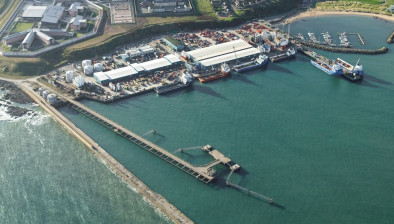Programme for Government: Praise for commitment to increased infrastructure investment
The Scottish Government has pledged to increase investment in infrastructure year on year so that by the end of the next Parliament it will be £1.5 billion higher than last year.

Announcing the move during a statement to the Scottish Parliament yesterday, First Minister Nicola Sturgeon said the Programme for Government 2020-2021 has investment in infrastructure “at its core” and aims to put Scotland “at the very forefront” of the transition to net-zero.
A new national infrastructure investment plan - informed by the Infrastructure Commission - will be published this setting out the framework for £32bn of infrastructure investment over the next five years.
Part of that investment will be in digital infrastructure, with the government’s £600m R100 programme set to make superfast broadband available to every home and every business across the country.
Capitalised to the tune of £2 billion over the next decade, the Scottish National Investment Bank will shortly open its door for business with its primary mission to drive the transition to a net zero economy.
The First Minister said: “I can confirm that the Bank is already in discussions about a range of projects for early investment – including supporting supply chains for zero-emission public transport.
“The Scottish National Investment Bank – which in my view, the most important economic development of this Parliament - will be key to creating the low carbon, high technology and highly skilled economy we want and are determined to build in Scotland.”
A 20-year vision for energy efficient, zero carbon housing has been promised later this year, with access to outdoor space, transport links, digital connectivity and community services to be prioritised. For social housing, the government will set new standards on carbon emissions, digital infrastructure, and access to outdoor space and room for home working.
Ms Sturgeon said: “This vision will be based on extensive consultation, and the Social Renewal Advisory Board – whose recommendations have been influential in several areas of this Programme - will help ensure it reflects our experiences of the pandemic.
“It will also be backed by substantial new funding for the remainder of the next parliament, which will be confirmed in the Capital Spending review later in the year.”
The First Minister added that the government is working with the construction sector to catch up with its target to deliver 50,000 affordable homes by the end of this parliament.
She said: “Investment in housing is also an investment in our economy, in jobs and in our communities. Before lockdown, we were on track to deliver to deliver 50,000 new affordable homes by the end of this parliament, 35,000 of them for social rent.
“We are working with the construction sector to catch up and hit that target as soon as possible. That has been a £3 billion investment and we intend to expand on it.”
Among the new measures is a £500 million investment to support active travel which will help local authorities develop new walkways, reallocate road space, and increase access to bikes.
Elsewhere, a National Transition Training Fund will support up to 10,000 people at risk of redundancy or unemployment, the Scottish Youth Guarantee will ensure every young person has the opportunity of work, education, or training, and a new £100m Green Jobs Fund will be created while a new Inward Investment Plan will create 100,000 high value jobs over the next decade and boost GDP.
Responses
Robin Blacklock, Scottish Property Federation (SPF) chair and MD Dowbrae Property Consultancy, welcomed the Programme for Government as outlined by the First Minister.
He said: “In particular, we support the focus on a robust and resilient wellbeing economy with additional support for jobs, infrastructure investment and a transition to a greener Scotland.
“Our economy remains fragile as a result of the COVID-19 pandemic; therefore, it remains critical that our industry is supported to help achieve the government’s objectives.”
Claire Mack, chief executive of Scottish Renewables, said: “The First Minister’s declaration of a £100m Green Jobs Fund and a £25m National Transition Training Fund are significant steps forward not just for our industry - which will require a large number of skilled employees as we work towards our net-zero target - but also for all those people whose careers are not compatible with that target.
“Scottish Renewables has worked hard with politicians from all parties over the past four months to make the case that renewable energy should be at the very heart of a green recovery from the coronavirus pandemic. We are pleased that our suggestion of funding to refocus careers and businesses on the provision of green skills to support Scotland’s transition to net-zero has found a place in this Programme for Government, and look forward to working with the Scottish Government as it further develops its plans in the coming months.
“In particular, in it important that Scotland’s skills and enterprise agencies and skills providers work in tandem with industry to ensure that skills which are delivered are those which are required. We are also keen that the development of a Renewable Energy Centre of Excellence takes place in Scotland to provide a physical base for the reshaping of our economy in the decades leading to the 2045 net-zero target.”
Institution of Civil Engineers Scotland director, Hannah Smith, added: “The importance of infrastructure is reiterated throughout the Programme for Government and the commitment to increase Scotland’s annual infrastructure investment until it is £1.5bn higher by the end of the next Parliament is to be welcomed. We now eagerly await the forthcoming Infrastructure Investment Plan.
“A post-COVID infrastructure landscape which is green, digital and inclusive is a vision all in our sector have.
“Scotland’s infrastructure is worth billions of pounds, but historic under-investment means portions of it are deteriorating and failing to realise their full benefit to the economy. Declaring maintenance a National Infrastructure Priority could see this trend reversed and offer a low-risk approach to kick-starting economic growth.
“It’s also critically important that we think about our infrastructure in the context of climate change – along with building new assets to help meet net zero targets, we need to focus on adapting our infrastructure so that it can withstand the new challenges a changing climate brings.”
Hew Edgar, head of UK Government relations and city strategy at the Royal Institution of Chartered Surveyors (RICS), said: “By announcing significant investment in infrastructure, and a refreshed infrastructure investment plan scheduled for publication later this month, the Scottish Government has evidently listened to RICS and sectoral concerns around post-COVID supply chain management. A vibrant construction sector contributes significantly to an active economy, and by publishing an infrastructure plan, a higher proportion of industry participants will be able to plan, order and manufacture supplies for the diverse range of construction sites in Scotland.
“Coupled with a drive to reemploy, retrain and upskill the workforce – particularly into green industries – the Programme’s focus on the environment is also beneficial as the Scottish Government should look to renew, repurpose and regenerate Scotland’s land and built environments.
“We were not surprised by the postponement of the rating revaluation, but the delay will result in a six-year gap between revaluations (between 2017 and 2023) and a seven-year gap in the tone date (2015 and 2022). RICS appreciates that the COVID-19 pandemic, and subsequent lockdown measures, have impacted circumstances that may be seen to hinder the feasibility of this revaluation. However, the main purpose of having a Revaluation, as highlighted by the Barclay Review on business rates, is for a redistribution of the tax burden.
“The Review called for frequent and regular Revaluations to take place with the valuation (tone) date to be as close as possible to the date the Revaluation takes effect. Whilst this latter point will be picked up, postponing the revaluation merely undermines the five-year public debate that started with the Barclay Review, and ended in the passing of the Non- Domestic Rates (Scotland) Act 2020. This only recently legislated for the next Revaluation to take place in 2022.
“Ideally, the Scottish Government should have continued with the status quo. The last thing ratepayers need is another creeping postponement, and the same degree of scepticism of the system and dissatisfaction that the previous postponement from 2015 to 2017 created.”
Housing organisations bemoaned the lack of new funding for social and affordable housing.
CIH Scotland national director, Callum Chomczuk, said: “We welcome the importance the First Minister placed on home in the programme for government. The £3m increase Discretionary Housing Payment money, £10m tenant hardship fund and further investment in Housing First were particularly welcome as housing professionals seek to support people to maintain their tenancies over the long term and ultimately end homelessness.
“But if we are serious about ending our housing crisis and addressing the social and economic problems exposed by COVID-19 then we need an ambitious programme of new social and affordable homes. The assurance that current 50,000 affordable and social housing programme will be completed as soon as possible was welcome, but we need to see the government commit to at least 53,000 social and affordable homes for the next Parliament.
“We recognise decision on the next social and affordable housing programme will be made after the allocation of the capital budget later this year, but if Scotland is to build back better after the pandemic then 53,000 social and affordable homes must be at the centre of our strategy.”
David Bookbinder, director at the Glasgow and West of Scotland Forum of Housing Associations (GWSF), said: “The lack of any new commitment to a longer term future new build programme is worrying. The Housing to 2040 vision has been around for more than a year now, but we’re still in the dark on what the Scottish Government’s real ambition is.
“On issue around the quality of what’s built, GWSF very much welcomes the intention to explore ways of building broadband connectivity into new homes. We note too the commitment to provide more new homes through offsite construction, but would caution against thinking that a large proportion of the new build programme can be provided in this way. The key to maximising housing’s contribution to carbon reduction lies in tackling poor conditions in existing private housing, including in older tenements.”
The Existing Homes Alliance welcomed the multi-year budget commitment of £1.6bn over the next parliament to making homes warm, zero carbon and affordable to heat by 2040.
Lori McElory, chair of the Existing Homes Alliance, said: “Building retrofit projects are critical to deliver a fairer and greener recovery. They are value for money investments because they provide an immediate economic impact, all over the country. They are ‘shovel ready’ and use local labour and SMEs. This investment will also improve health and wellbeing, saving money for the NHS and helping to eradicate fuel poverty.
“We look forward to studying the detail of these announcements to understand how they will meet the welcome intent of all buildings being zero emissions from heat by 2040.”
Fabrice Leveque, acting head of policy at WWF Scotland, added: “There were some welcome steps announced by the First Minister to help Scotland’s green recovery from the COVID-19 crisis. The increase in funding to make our homes more energy efficient, investment in walking and cycling and a focus on green skills, will all help rebuild the economy and bring wider benefits like cleaner air and improved health to the people of Scotland.
“The First Minister rightly recognises that we are facing climate and nature emergencies. Whilst an increase to tree planting is welcome there is little to build on last year’s good commitments to accelerate emissions cuts through land use and the step change required to restore nature.
“The recent storms that hit Scotland have highlighted the potential costs of failing to act with urgency, and it is vital that the Scottish Government now turns its plans quickly to reality.”
















